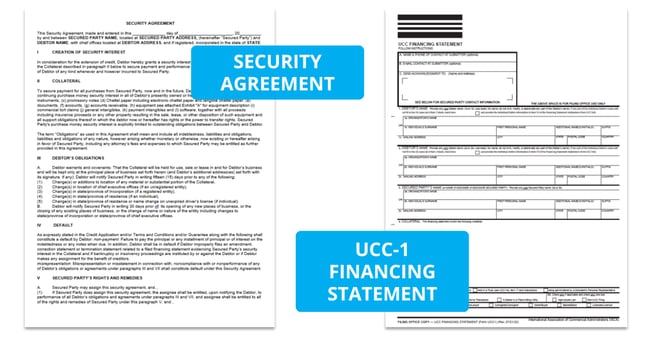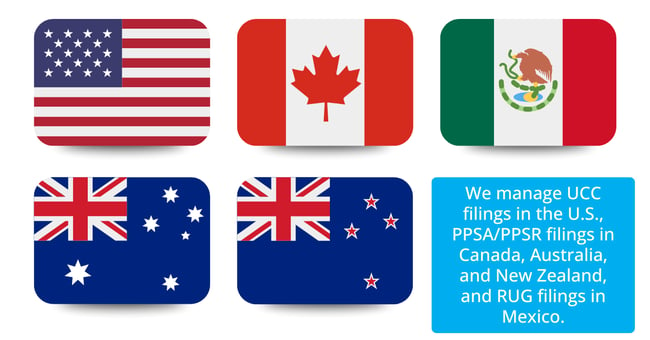Rental Equipment in Pennsylvania: The UCC Filing Advantage
No Mechanic’s Lien Rights for Rental Equipment in Pennsylvania Originally published in the Credit Research Foundation’s publication, Perspective by ...

The Uniform Commercial Code is a set of standardized laws that govern commercial transactions across the U.S. Article 9 of the Uniform Commercial Code (UCC) governs secured transactions in personal property. It allows creditors to secure payment by establishing a security interest in a debtor’s assets, such as accounts receivable, inventory, or equipment, helping protect the creditor’s right to collect if the debtor defaults.
A UCC filing is a document filed with the Secretary of State that serves as public notice of a creditor’s security interest in specific collateral owned by a debtor.
The purpose of a UCC filing is to give public notice that a creditor has a security interest in a debtor’s personal property such as inventory, equipment, or accounts receivable. UCC filings help:

UCCs are consensual, meaning the filing requires the debtor’s consent or permission. Consent is typically granted through a Security Agreement, which includes a granting clause, whereby the debtor gives the creditor a security interest in specific collateral.
Note, having your customer sign an agreement that is missing a granting clause means your customer isn’t providing consent for you to file the UCC on the collateral.
UCC filings under Article 9 create consensual liens agreed to by both creditor and debtor through a security agreement. This sets them apart from statutory liens, like mechanic’s liens or tax liens, which arise by operation of law and do not require debtor consent. Consensual liens offer more flexibility in defining collateral & terms and allow creditors to file preemptively.
Unlike judicial liens, which require a lawsuit and court judgment, UCC filings allow you to perfect a security interest without going to court, making them faster and more cost-effective. Understanding how UCC filings compare to other lien types helps you choose the best tool for protecting your interests.
A UCC filing is frequently referred to as a UCC-1 or UCC-1 Financing Statement. Though, there are some additional names which include UCC statement, secured transaction filing, security interest filing, lien filing or UCC lien.
A properly perfected security interest (or UCC filing) protects any party extending credit to its customers. Distributors, equipment rental companies, material suppliers, financial institutions, leasing companies, and factoring companies would all benefit from the protection of UCCs.
When handled professionally, a UCC filing doesn’t negatively impact your customer or the relationship with your customer. In fact, it’s a common and accepted business practice. Most customers understand a UCC filing is simply a way to protect your financial interest in the goods or services you’ve provided.
It’s not a reflection of distrust, it’s a tool to secure your position, just like a mortgage secures a lender. Being transparent and explaining the purpose of the filing (especially during the credit application process) helps maintain trust and avoid surprises.
We’ve drafted a letter/email you can send to your customer which helps explain UCC filings. (You can view that letter here.) The letter explains you file UCCs as part of your credit granting process, the UCC won’t hurt your customer’s credit rating and it doesn’t cost your customer anything.
Yes, a UCC filing can significantly improve your chances of getting paid by securing your rights to the customer’s collateral.
An analysis of 2024 Chapter 11 bankruptcy plans revealed secured creditors’ median rate of recovery was 98%, while unsecured creditors’ median rate of recovery was 21%.
If your customer defaults or files for bankruptcy, a properly filed UCC-1 gives you priority over unsecured creditors, meaning you may be first in line to recover payment through repossession or liquidation of assets like inventory, equipment, or receivables.
It doesn’t guarantee payment, but it turns you from an unsecured creditor into a secured one, which gives you powerful leverage, especially in high-risk or financially unstable situations.
Read how one secured creditor leveraged its UCC filing to recover $95,000.
Under Article 9, default is generally defined as the failure of the debtor to fulfill their obligations under the security agreement. While Article 9 does not provide a specific definition of default, it gives secured parties the right to enforce remedies when a default occurs and the exact definition of default is typically outlined in the security agreement itself.
Common Examples of Default:
The right of repossession under Article 9 of the Uniform Commercial Code (UCC) allows a secured creditor to take back possession of collateral when a debtor defaults on their obligation. Repossession can happen without a court order if it can be done without breaching the peace (i.e., no force, threats, or trespassing).
The right of repossession is a powerful tool that gives secured creditors a direct path to recovering losses when a customer defaults—but it must be exercised carefully and lawfully.
When a customer defaults, repossession is only one of several remedies available under Article 9 of the Uniform Commercial Code. A secured creditor also has the right to dispose of the collateral in a commercially reasonable manner, either through public auction, private sale, or another method allowed by law. Before doing so, the creditor is typically required to provide advance notice to the debtor and any other known secured parties. The proceeds of the sale are then applied to the debt, with any surplus returned to the debtor. These rights give secured creditors powerful tools to recover losses, but they must be exercised carefully and in accordance with Article 9 to avoid legal complications.
Yes, there are different types of UCCs. The two primary types of secured transactions under Article 9 are Blanket filings and Purchase Money Security Interest (PMSI) filings. Additional filings include consignment, bailment, tooling, warehousing arrangement and installments or promissory notes.
Generally, to establish a security interest, you must execute a Security Agreement and then file a UCC-1 with the appropriate state filing office (e.g., Secretary of State).

A Security Agreement should include:
Article 9-502 clearly identifies the information that is to appear in the Financing Statement: the name of the debtor, the name of the secured party and the collateral description.
(a) [Sufficiency of financing statement.] Subject to subsection (b), a financing statement is sufficient only if it:
(1) provides the name of the debtor;
(2) provides the name of the secured party or a representative of the secured party; and
(3) indicates the collateral covered by the financing statement.
Articles of Incorporation are required to verify an entity’s legal name and to verify jurisdiction. In compliance with UCC 9-503(a), when the debtor is a registered organization, creditors should rely on the information found on the public organic record (e.g., Articles of Incorporation).
Using an incorrect name, such as a trade name, abbreviation, or misspelling, can render the UCC filing ineffective and jeopardize the secured party’s interest.
The Articles also confirm the debtor’s state of incorporation, which determines the proper jurisdiction for filing the UCC-1, typically with the Secretary of State. In addition, the Articles can help verify the business is a valid legal entity in good standing, which is useful during credit evaluations and due diligence. While Articles of Incorporation are not submitted with the UCC filing itself, they are essential for ensuring the filing is accurate and enforceable.
Under the 2010 UCC Amendments, states chose between Alternative A (the “Only If” rule) and Alternative B (the “Safe Harbor” rule). If the debtor is an individual, creditors must first look to the state legislation. With the 2010 Amendments, each state had to decide whether they would implement “Alternative A” or “Alternative B.”
A reflective UCC search confirms that a UCC filing was recorded. The reflective search returns a jurisdictional report by debtor name reflecting all UCC filings through the date of your recorded UCC filing. This search also lists previously secured creditors by filing dates to help determine your filing position.
The accuracy of your Security Agreement can make or break your properly perfected security interest. Compliance with Article 9 of the Uniform Commercial Code must be precise. Avoid these common mistakes in your agreement:
Using the correct forms is essential to ensure the filing is legally effective and properly recorded. The most common forms are the UCC-1 for initial filings and the UCC-3 for amendments, continuations, assignments, or terminations.
These standardized forms are designed to meet the requirements of the Uniform Commercial Code and using them helps ensure all necessary information is included. Filing the wrong form, forgetting to file attachments, or omitting required details can lead to rejection by the filing office or result in an ineffective filing that fails to perfect the security interest.
When should you terminate the original UCC Financing Statement? Section 9-513 of the Uniform Commercial Code states that a secured party must terminate a UCC filing within 20 days of a request from the debtor if any of the following exist:
Otherwise, the UCC filing will remain active until the 5-year lapse date, which can cause financial complications between the debtor and their bank. As a best practice, terminate your UCC filings in a timely manner.
If you accidentally terminate a UCC, you’ve effectively released your security interest in the debtor’s assets and lost your place in line. Unfortunately, a terminated filing can’t be revived. To protect your rights, you’ll need to file a new UCC-1. Just know that any creditors who perfected their interest before your new filing will now have priority.
Secured transactions are available in other countries, though they aren’t referred to as UCCs. In Canada, Australia and New Zealand the PPSA or PPSR are the equivalent to the U.S.’s UCC. In Mexico, creditors pledge collateral under the RUG.

Yes, there are alternatives to filing UCCs if you're a business extending credit to customers, but each comes with its own advantages, limitations, and risk profiles. A few common options include personal guarantees, credit insurance, letters of credit, or cash in advance.
You can require the business owner or a third party to personally guarantee the debt. This gives you the right to pursue their personal assets if the business defaults, but it doesn’t create a security interest in specific property like a UCC filing does.
A properly perfected security interest can reduce risks associated with personal guarantees.
Trade credit insurance protects your receivables against customer non-payment due to insolvency, slow pay, or political risk (for international customers).
Secured vs. Insured: why not both? Let’s compare:
|
UCC Filings
|
Credit Insurance
|
UCC Filings & Credit Insurance
|
|
|
Fixed Cost: regardless of your customer's financial profile
|
|||
|
Mitigates Risk: reduces bad debt write-offs and improves DSO
|
|||
|
Security Interest: grants you rights to the collateral used to secure the line of credit
|
|||
|
Payment Priority: secures your spot in the payment line if your customer defaults or files for bankruptcy
|
|||
|
Identifies Risks: actuaries provide analysis to identify potential losses
|
|||
|
Transfers Risk: risk is transferred to the insurer's balance sheet
|
|||
|
Public Record: establishes a public acknowledgement of the financial agreement
|
Issued by a bank on behalf of your customer, a letter of credit guarantees payment if the customer defaults.
Requiring payment upfront or on delivery limits your credit exposure entirely.
UCC filings offer stronger proactive protection than relying solely on 503(b)(9) claims in the event of a customer’s bankruptcy. A properly filed UCC-1 establishes a secured interest in the debtor’s assets, which gives you priority status and the ability to recover from collateral or proceeds. This protection begins at the time of filing and applies to a wide range of assets, including inventory, equipment, and accounts receivable, regardless of when they were delivered.
In contrast, a 503(b)(9) claim is limited to goods received by the debtor within 20 days prior to filing for bankruptcy and does not apply to services or older unpaid invoices. While 503(b)(9) claims do offer administrative priority over unsecured claims, they are not secured and must go through the bankruptcy court’s approval process, often facing delays or objections. UCC filings provide more certainty, broader protection, and better positioning in a bankruptcy scenario, making them a more effective and reliable tool for securing payment.
At NCS Credit, we know that filing a UCC is just the beginning. Managing your UCC portfolio is critical for long-term protection. Each filing must be tracked for expiration, continuations, amendments, debtor name changes, and more. A lapse in coverage or an error in the filing details can jeopardize your secured position and leave your business exposed. That’s why proactive management is critical to maintaining your rights as a secured creditor.
Partnering with a commercial agency like NCS Credit gives you the tools and support to stay ahead. We don’t just file, monitor, manage, and ensure your UCCs stay compliant throughout their lifecycle. Our team leverages decades of experience, jurisdictional expertise, and automated tracking systems to help you avoid costly oversights. Whether it’s maintaining perfection, tracking debtor activity, or advising on amendments and terminations, we handle the heavy lifting so you can focus on growing your business, with the confidence that your security interests are protected.

No Mechanic’s Lien Rights for Rental Equipment in Pennsylvania Originally published in the Credit Research Foundation’s publication, Perspective by ...

Selling Equipment? Here’s Our Best Practices for Equipment UCC Filings Purchase Money Security Interest (PMSI) Filings were created to encourage...

Omission of “Inc.” Left Security Interest Unperfected The proper spelling of a debtor’s name on UCC Financing Statement is currently one of the most...